In this post I have collected my translations of the various homilies and addresses given by Pope Francis during his short visit to Sweden. Perhaps needlessly said, apart from this paragraph, the post will consist of Dutch text.

Homilie tijdens de oecumenische gebedsdienst in Lund:
“”Blijf in mij zoals ik in u” (Joh. 15:4). Deze woorden, uitgesproken door Jezus bij het Laatste Avondmaal, laten ons een blik werpen in het hart van Christus, kort voor Zijn ultieme offer aan het kruis. We kunnen Zijn hart voelen kloppen met liefde voor ons en Zijn verlangen voor eenheid onder allen die in Hem geloven. Hij vertelt ons dat Hij de ware wijnstok is en wij de ranken die, net zoals Hij één is met de Vader, één met Hem moeten zijn, willen we vrucht dragen.
Hier in Lund, tijdens deze gebedsdienst, willen wij ons gezamenlijk verlangen laten zien om één te blijven met Christus, zodat we leven hebben. We vragen Hem: “Heer, help ons in uw genade om dichter met U verenigd te zijn en zo, samen, een effectievere getuigenis te geven van geloof, hoop en liefde.” Dit is ook een moment om God te danken voor het werk van onze vele broeders en zusters van verschillende kerkelijke gemeenschappen die weigerden genoeg te nemen met verdeeldheid, maar in plaats daarvan de hoop op verzoening van allen die in de ene Heer geloven levend hielden.
Als katholieken en Lutheranen zijn we een gezamenlijke weg van verzoening gegaan. Nu, in de context van de herdenking van de Reformatie van 1517, hebben we een nieuwe kans om een gezamenlijke weg te kiezen, één die in de afgelopen vijftig jaar vorm heeft gekregen in de oecumenische dialoog tussen de Lutherse Wereldfederatie en de Katholieke Kerk. Ook wij kunnen geen genoegen nemen met de verdeeldheid en afstand die onze scheiding tussen ons geschapen heeft. Wij hebben de kans een kritiek moment van onze geschiedenis te repareren door voorbij de controverses en meningsverschillen, die ons er vaak van hebben weerhouden elkaar te begrijpen, te gaan.
Jezus zegt ons dat de Vader de “wijngaardenier” is (vg. vers 1) die de wijnstok verzorgt en snoeit om te zorgen dat die meer vrucht draagt (vg. vers 2). De Vader heeft steeds zorg voor onze relatie met Jezus, om te zien of we werkelijk één met Hem zijn (vg. vers 4). Hij waakt over ons, en Zijn blik van liefde zet ons aan ons het verleden te zuiveren en in het heden te werken om een toekomst van eenheid tot stand te brengen, die Hij zozeer verlangt.
Ook wij moeten met liefde en eerlijkheid naar ons verleden kijken, fouten herkennen en vergeving zoeken, want God alleen is onze rechter. Met dezelfde eerlijkheid en liefde moeten we inzien dat onze verdeeldheid ons scheidt van de oorspronkelijke intuïtie van het volk van God, dat van nature verlangt één te zijn, en dat die verdeeldheid historisch bestendigd werd door de machthebbers van deze wereld, en niet zozeer het gelovige volk, dat altijd en overal met zekerheid en liefde door zijn Goede Herder geleid moet worden. Zeker, er was aan beide zijden een oprechte wil om het ware geloof te belijden en te behouden, maar tegelijkertijd weten we dat we in onszelf zijn opgesloten door angst voor of vooroordeel over het geloof dat anderen met een ander accent en taal belijden. Zoals Paus Johannes Paulus II zei: “We moeten niet toestaan dat wij worden geleid door de intentie onszelf te willen benoemen als rechters van de geschiedenis, maar alleen door de motivatie om beter te willen begrijpen wat er is gebeurd en om boodschappers van de waarheid te worden” (Brief aan Kardinaal Johannes Willebrands, President van het Secretariaat voor de Christelijke Eenheid, 31 oktober 1983). God is de wijngaardenier, die de wijnrank met immense liefde verzorgd en beschermd; laten wij geraakt zijn door Zijn waakzame blik. Het enige dat Hij verlangt is dat wij als levende ranken in Zijn Zoon Jezus blijven. Met deze nieuwe blik op het verleden beweren we niet een onpraktische correctie op wat er gebeurd is te willen realiseren, maar “het verhaal anders te vertellen” (Luthers-Rooms Katholieke Commissie over de Eenheid, Van Conflict naar Eenheid, 17 juni 2013, 16).
Jezus herinnerert ons eraan: “Los van Mij kunnen jullie niets” (vers 5). Hij is degene die ons onderhoudt en ons aanmoedigt manieren te vinden om onze eenheid steeds zichtbaarder te maken. Zeker, ons verdeeldheid is een enorme bron van lijden en onbegrip geweest, maar het heeft ons er ook toe geleid eerlijk te erkennen dat we zonder Hem niets kunnen; zo heeft het ons in staat gesteld bepaalde aspecten van ons geloof beter te begrijpen. Dankbaar erkennen we dat de Reformatie geholpen heeft de Heilige schrift een meer centrale plaats te geven in het leven van de Kerk. Door het gezamenlijk luisteren naar het woord van God in de Schrift zijn er belangrijke stappen voorwaarts gezet in de dialoog tussen de Katholieke Kerk en de Lutherse Wereldfederatie, wiens vijftigste verjaardag we nu vieren. Laten we de Heer vragen dat Zijn woord ons bijeen mag houden, want het is een bron van voeding en leven; zonder de inspiratie van het woord kunnen we niets.
De geestelijk ervaring van Maarten Luther daagt ons uit ons te herinneren dat wij zonder God niets kunnen. “Hoe kan ik een genadige God verkrijgen?” Deze vraag achtervolgde Luther. De vraag van een rechtvaardige relatie met God is in feite de bepalende vraag voor ons leven. Zoals we weten ontmoette Luther die genadige God in het goede nieuws van Jezus, mensgeworden, gestorven en verrezen. Met het concept van sola gratia herinnert hij ons eraan dat God altijd het initiatief neemt, nog voor enige menselijke reactie, zelfs als Hij dat antwoord wil opwekken. De rechtvaardigingsleer drukt zo de essentie van het menselijke bestaan tegenover God uit.
Jezus spreekt voor ons als onze bemiddelaar voor de Vader; Hij vraagt Hem dat Zijn leerlingen één mogen zijn, “zodat de wereld kan geloven” (Joh. 17:21). Dat geeft ons troost en inspireert ons om één te zijn met Jezus, en daarom te bidden: “Geef ons de gave van eenheid zodat de wereld kan geloven in de kracht van uw barmhartigheid”. Dit is de getuigenis die de wereld van ons verwacht. Wij christenen zullen geloofwaardige getuigen van de barmhartigheid zijn in zoverre dat vergeving, vernieuwing en verzoening dagelijks onder ons worden ervaren. Samen kunnen wij Gods barmhartigheid verkondigen en zichtbaar maken, concreet en met vreugde, door de waardigheid van ieder persoon hoog te houden en te bevorderen. Zonder deze dienst aan en in de wereld is het christelijk geloof onvolledig.
Als Lutheranen en katholieken bidden wij samen in deze kathedraal, in het bewustzijn dat we zonder God niets kunnen. Wij vragen Zijn hulp om levende ledematen te zijn, blijvend in Hem, steeds met behoefte aan Zijn genade, zodat we samen Zijn woord aan de wereld kunnen geven, die zijn tedere liefde en barmhartigheid zo nodig heeft.”
Gezamenlijke verklaring ter gelegenheid van de gezamenlijke Katholiek-Lutheraanse herdenking van de Reformatie:

“”Laten we met elkaar verbonden blijven, jullie en Ik, want zoals een rank geen vrucht kan dragen uit eigen kracht, maar alleen als ze verbonden blijft met de wijnstok, zo kunnen ook jullie geen vrucht dragen als je niet met Mij verbonden blijft” (Johannes 15:4).
Met dankbare harten
Met deze Gezamenlijke Verklaring drukken wij vreugdevolle dankbaarheid aan God uit voor dit moment van gezamenlijk gebed in de kathedraal van Lund, aan het begin van het jaar waarin we het vijfhonderdste jubileum van de Reformatie herdenken. Vijftig jaar aanhoudende en vruchtbare oecumenische dialoog tussen katholieken en Lutheranen heeft ons geholpen vele verschillen te overbruggen, en heeft ons wederzijds begrip en vertrouwen versterkt. Tegelijkertijd zijn we dichter tot elkaar gekomen door de gezamenlijke dienst aan onze naasten – vaak in situaties van lijden en vervolging. Door dialoog en gedeelde getuigenis zijn we niet langer vreemden. We hebben veeleer geleerd dat wat ons verenigdt groter is dan wat ons scheidt.
Van conflict naar gemeenschap
Hoewel we ten diepste dankbaar zijn voor de geestelijke en theologische gaven van de Reformatie, belijden en betreuren we voor Christus ook dat Lutheranen en katholieken de zichtbare eenheid van de Kerk hebben beschadigd. Theologische verschillen gingen samen met vooroordelen en conflicten, en religie werd een instrument voor politieke doeleinden. Ons gezamenlijk geloof in Jezus Christus en ons doopsel vereist van ons een dagelijkse bekering, waarmee we de historische meningsverschillen en conflicten die het dienstwerk van de verzoening verhinderden van ons afwerpen. Hoewel het verleden niet verandert kan worden, kan wat er herinnert wordt en hoe het wordt herinnert wel veranderen. Wij bidden voor de genezing van onze wonden en van de herinneringen die ons beeld van de ander blokkeren. We verwerpen nadrukkelijk alle haat en geweld, in het verleden en heden, vooral wanneer uitgevoerd in de naam van religie. Vandaag horen we het gebod van God om alle strijd aan de kant te zetten. We erkennen dat we, bevrijd door genade, voorwaarts gaan naar de eenheid waartoe God ons steeds roept.
Onze toewijding aan gezamenlijke getuigenis
Nu we die periode in de geschiedenis als een last achter ons laten, beloven wij plechtig samen te getuigen van Gods barmhartige genade, zichtbaar in de gekruisigde en verrezen Christus. In het bewustzijn dat de manier waarop wij ons tot elkaar verhouden onze getuigenis van het Evangelie vorm geeft, wijden wij ons toe aan de verdere groei van gemeenschap, geworteld in het doopsel, terwijl we proberen de overblijvende obstakels die volledige eenheid nog verhinderen te verwijderen. Christus verlangt dat we één zijn, zodat de wereld kan geloven (vg. Joh. 17:21).
Vele leden van onze gemeenschappen verlangen ernaar de Eucharistie aan één tafel te ontvangen als een concrete uitdrukking van volledige eenheid. Wij ervaren de pijn van degenen die hun hele leven delen, behalve de verlossende aanwezigheid van God aan de Eucharistische tafel. Wij erkennen onze gezamenlijke pastorale verantwoordelijkheid om een antwoord te geven op de geestelijke dorst en honger van onze mensen om één te zijn in Christus. Wij verlangen ernaar dat deze wond in het Lichaam van Christus zal genezen. Dit is het doel van onze oecumenische inspanningen, die we willen bevorderen, ook door onze toewijding aan de theologische dialoog te hernieuwen
We bidden tot God dat katholieken en Lutheranen samen zullen kunnen getuigen van het Evangelie van Jezus Christus, en de mensheid uitnodigen het goede nieuws van Gods verlossende handelen te horen en ontvangen. We bidden tot God om inspiratie, aanmoediging en kracht zodat we naast elkaar kunnen staan in het dienstwerk, de menselijke waardigheid en rechten hooghouden, met name van de armen, werken voor gerechtigheid en alle vormen van geweld afwijzen. God roept ons op allen die verlangen naar waardigheid, gerechtigheid, vrede en verzoening nabij te zijn. Vandaag in het bijzonder verheffen we onze stemmen voor een einde aan het geweld en extremisme dat zo vele landen en gemeenschappen, en talloze zusters en broeders in Christus, treft. We sporen Lutheranen en katholieken aan om samen te werken in het ontvangen van de vreemde, degenen die gedwongen zijn te vluchten vanwege oorlog of vervolging te hulp te komen, en de rechten van vluchtelingen en asielzoekers te verdedigen.
Meer dan ooit beseffen we dat ons gezamenlijk dienstwerk in deze wereld moet reiken tot aan Gods scheppen, die lijdt onder uitbuitingen en de gevolgen van onverzadelijke hebzucht. We erkennen het recht van toekomstige generaties om te genieten van Gods wereld in al haar potentieel en schoonheid. We bidden voor een omslag in harten en hoofden die leidt tot een liefdevolle en verantwoordelijke zorg voor de schepping.
Eén in Christus
Op deze gunstige gelegenheid drukken wij onze dankbaarheid uit aan onze broeders en zusters die de verschillende christelijke wereldgemeenschappen en broederschappen vertegenwoordigen die hier aanwezig zijn en zich aansluiten bij ons gebed. Nu we ons opnieuw toewijden aan de beweging van conflict naar gemeenschap, doen we dat als ledematen van het ene Lichaam van Christus, waarin we door het doopsel zijn opgenomen. We nodigen onze oecumenische partners uit ons aan onze verplichtingen te herinneren en ons te bemoedigen. We vragen hen voor ons te blijven bidden, met ons op weg te gaan en ons te ondersteunen in het uitvoeren van de gebedsvolle verplichtingen die wij vandaag uitspreken.
Oproep aan katholieken en Lutheranen in de wereld
Wij roepen alle Lutherse en katholieke parochies en gemeenschappen op om stoutmoedig en creatief, vol vreugde en hoop te zijn in hun toewijding om de grote reis voor ons voort te zetten. In plaats van conflicten uit het verleden, zal Gods geschenk van eenheid onder ons de samenwerking leiden en onze solidariteit verdiepen. Door dichter in het geloof tot Christus te komen, door samen te bidden, door naar elkaar te luisteren, door de liefde van Christus voor te leven in onze relaties, zullen wij, katholieken en Lutheranen, onszelf openstellen voor de kracht van de Drieëne God. Geworteld in Christus en van Hem getuigend vernieuwen wij onze vastberadenheid om trouwe voorboden te zijn van Gods grenzeloze liefde voor de hele mensheid.”
Toespraak tijdens het Oecumenisch evenement in Malmö Arena:

“Ik dank God voor deze gezamenlijke herdenking van het vijfhonderste jubileum van de Reformatie. We gedenken dit jubileum met een hernieuwde geest en erkennen dat de christelijke eenheid een prioriteit is, omdat we weten dat er meer is dat ons verenigt dan ons scheidt. De weg die we gegaan zijn om die eenheid te bereiken is zelf een groot geschenk dat God ons geeft. Met deze hulp zijn we vandaag hier bijeen gekomen, Lutheranen en katholieken, is een geest van broederschap, om onze blik te richten op de ene Heer, Jezus Christus.
Onze dialoog heeft ons geholpen te groeien in wederzijds begrip; het heeft wederzijds vertrouwen bevordert en ons verlangen om verder te gaan naar volledige eenheid bevestigd. Eén van de vruchten van deze dialoog is de samenwerking tussen verschillende organisaties van de Lutherse Wereldfederatie en de Katholieke Kerk. Dankzij deze nieuwe sfeer van begrip zullen Caritas Internationalis en de World Service van de Lutherse Wereldfederatie vandaag een gezamenlijk overeengekomen verklaring ondertekenen die gericht is op het ontwikkelen en versterken van een geest van samenwerking ter bevordering van de menselijke waardigheid en sociale gerechtigheid. Ik groet van harte de leden van beide organisaties; in een wereld die door oorlogen en conflicten uit elkaar getrokken wordt, zijn en blijven zij een lichtend voorbeeld van toewijding tot en dienst aan de naaste. Ik moedig u aan voort te gaan op de weg van samenwerking.
Ik heb aandachtig geluisterd naar de mensen die getuigenis hebben gegeven, hoe zij te midden van zoveel uitdagingen dagelijks hun leven toewijden aan het opbouwen van een wereld die steeds meer wil reageren op het plan van God, onze Vader. Pranita sprak over de schepping. De schepping zelf is duidelijk een teken van Gods grenzeloze liefde voor ons. Als gevolg kunnen de geschenken van de natuur ons tot het overwegen van God aanzetten. Ik deel je zorg over het misbruik dat onze planeet, ons gezamenlijk thuis, schaadt en ernstige gevolgen heeft voor het klimaat. Zoals we in ons, in mijn land zeggen: “Uiteindelijk zijn het de armen die de kosten betalen voor ons feesten”. Zoals jij terecht opmerkte hebben zij de grootste impact op degenen die het meest kwetsbaar en behoeftig zijn; zij worden gedwongen te emigreren om aan de gevolgen van klimaatverandering te ontsnappen. Wij allemaal, en wij christenen in het bijzonder, zijn verantwoordelijk voor de bescherming van de schepping. Onze manier van leven en ons handelen moet altijd overeenstemmen met ons geloof. Wij zijn geroepen harmonie op te wekken in onszelf en met anderen, maar ook met God en Zijn handwerk. Pranita, ik moedig je aan vol te houden in je toewijding in naam van ons gezamenlijk thuis. Dank je!
Mgr. Hector Fabio vertelde ons over het gezamenlijk werk van katholieken en Lutheranen in Colombia. Het is goed om te weten dat christenen samenwerken om gemeenschappelijke en maatschappelijke processen van algemeen belang op te starten. Ik vraag jullie in het bijzonder te bidden voor dat grootse land, zodat, door middel van de samenwerking van iedereen, de vrede, waar zo naar verlangd wordt en die zo nodig is voor een menswaardig samenleven, eindelijk kan worden behaald. En omdat het menselijk hart, als het naar Jezus kijkt, geen grenzen kent, moge het dan een gebed zijn dat verder reikt, en al die landen omvat waar ernstige conflicten voortduren.
Marguerite maakt ons bewust van de hulp aan kinderen die het slachtoffers zijn van wreedheid en het werk voor de vrede. Dit is zowel bewonderenswaardig en een oproep om de talloze situaties van kwetsbaarheid van zo vele personen die zich niet kunnen laten horen serieus te nemen. Wat jij als missie beschouwd is een zaadje, een zaadje dat overvloedig vrucht draagt, en vandaag, dankzij dat zaadje, kunnen duizenden kinderen studeren, groeien en in goede gezondheid leven. Je hebt geïnvesteerd in de toekomst! Dank je! En ik ben dankbaar dat je zelfs nu, in ballingschap, een boodschap van vrede blijft verspreiden. Je zei dat iedereen die jou kent denkt dat wat je doet gek is. Natuurlijk, het is de gekte van de liefde voor God en onze naaste. We hebben meer van die gekte nodig, verlicht door het geloof en vertrouwen op de voorzienigheid van God. Blijf werken, en moge die stem van hoop die je aan het begin van je avontuur hebt gehoord, en je investering in de toekomst, je eigen hart en de harten van vele jonge mensen blijven raken.
Rose, de jongste, gaf een werkelijk ontroerende getuigenis. Ze heeft gebruik kunnen maken van het sporttalent dat God haar gaf. In plaats van haar energie te verspillen in negatieve situaties heeft ze voldoening gevonden in een vruchtbaar leven. Luisterend naar jouw verhaal, dacht ik aan de levens van zoveel jonge mensen die verhalen als het jouwe zouden moeten horen. Ik wil dat iedereen weet dat ze kunnen ontdekken hoe prachtig het is om kinderen van God te zijn en wat een privilege het is om door Hem geliefd en gekoesterd te zijn. Rose, ik dank je vanuit mijn hart voor jouw werk en toewijding om andere vrouwen aan te moedigen om weer naar school te gaan, en voor het feit dat je dagelijks bidt voor vrede in de jonge staat Zuid-Sudan, die dat zo erg nodig heeft.
En na het horen van deze krachtige getuigenissen, die ons deden nadenken over onze eigen levens en hoe we reageren op de noodsituaties overal om ons heen, wil ik al die regeringen danken, die vluchtelingen helpen, alle regeringen die ontheemde mensen asielzoekers helpen. Alles dat gedaan wordt om deze mensen in nood te helpen is een groots gebaar van solidariteit en een erkenning van hun waardigheid. Voor ons christenen is het prioriteit om erop uit te gaan en de verstotenen – want zij zijn werkelijk verstoten uit hun thuislanden – en de gemarginaliseerden van onze wereld te ontmoeten, en de tedere en barmhartige liefde van God, die niemand afwijst en iedereen accepteert, voelbaar te maken. Wij christenen zijn vandaag geroepen om actieve deelnemers te zijn in de revolutie van tederheid.
Straks horen we de getuigenis van Bisschop Antoine, die in Aleppo woont, een stad die op de knieën gedwongen is door de oorlog, een plaats waar zelfs de meest fundamentele rechten met minachting worden behandelt en vertrapt. In het nieuws horen we elke dag over het afschuwelijke lijden vanwege de strijd in Syrië, door dat conflict in ons geliefde Syrië, die nu al meer dan vijf jaar duurt. Te midden van zoveel verwoesting is het werkelijk heldhaftig dat mannen en vrouwen daar gebleven zijn om materiële en geestelijke hulp te bieden aan de noodlijdenden. Het is ook bewonderenswaardig dat jij, beste broeder Antoine, blijft werken tussen zulk gevaar om ons te kunnen vertellen over de tragische omstandigheden van het Syrische volk. We houden ieder van hen in onze harten en gebeden. Laten we de genade van oprechte bekering afsmeken over de verantwoordelijken voor het lot van de wereld, voor die regio en voor allen die daar ingrijpen.
Beste broeders en zusters, laat ons niet ontmoedigd raken tegenover vijandigheid. Moge de verhalen, de getuigenissen die we hebben gehoord, ons motiveren en ons een nieuwe impuls geven om steeds nauwer samen te werken. Als we weer thuiskomen, mogen we dan een toewijding meebrengen om dagelijkse gebaren van vrede en verzoening te maken, om moedige en trouwe getuigen van christelijke hoop te zijn. En zoals we weten, de hoop stelt ons niet teleur! Dank u!”
Homilie in de Mis voor Allerheiligen:
“Vandaag vieren we met de hele Kerk het hoogfeest van Allerheiligen. Hiermee herdenken we niet alleen hen die in de loop der eeuwen heiligverklaard zijn, maar ook onze vele broeders en zusters die, op een stille en onopvallende wijze, hun christelijk leven hebben geleefd in de volheid van geloof en liefde. Onder hen zijn zeker vele van onze verwanten, vrienden en bekenden.
Dit is voor ons dan een viering van heiligheid. Een heiligheid die niet zozeer te zien is in grote daden of buitengewone gebeurtenissen, maar veeleer in dagelijkse trouw aan de eisen van ons doopsel. Een heiligheid die bestaat in de liefde voor God en de liefde voor onze broeders en zusters. Een liefde die trouw blijft tot het punt van zelfopoffering en volledige toewijding aan anderen. We denken aan de levens van al die moeders en vaders die zich opofferen voor hun gezinnen en bereid zijn – ook al is dat niet altijd makkelijk – van zoveel dingen af te zien, zoveel persoonlijke plannen en projecten.
Maar als er één ding typisch is voor de heiligen, is het dat zij daadwerkelijk gelukkig zijn. Zij hebben het geheim van authentiek geluk ontdekt, dat diep in de ziel ligt en zijn bron heeft in de liefde van God. Daarom noemen we de heiligen zalig. De Zaligsprekingen zijn hun weg, hun doel richting het thuisland. De Zaligsprekingen zijn de weg van het leven die de Heer ons leert, zodat wij in Zijn voetstappen kunnen volgen. In het Evangelie van de Mis van vandaag hoorden we hoe Jezus de Zaligsprekingen verkondigde aan een grote menigte op de heuvel bij het Meer van Galilea.
De Zaligsprekingen zijn het beeld van Christus en als gevolg van elke christen. Ik zou er hier slechts één willen noemen: “Zalig die zachtmoedig zijn”. Van zichzelf zegt Jezus: “Kom bij Mij in de leer, omdat Ik zachtmoedig ben en eenvoudig van hart” (Matt. 11:29). Dit is zijn geestelijk portret en het onthult de overvloed van Zijn liefde. Zachtmoedigheid is een manier van leven en handelen die ons dichter bij Jezus en elkaar brengt. Het stelt ons in staat alles dat ons verdeelt en vervreemd aan de kant te zetten, en steeds nieuwe manieren te vinden om verder te gaan op de weg van eenheid. Zo was het met de zonen en dochters van dit land, waaronder de heilige Maria Elisabeth Hesselblad, kortgeleden heiligverklaard, en de heilige Birgitta van Vadstena, mede-patrones van Europa. Zij hebben gebeden en gewerkt om banden van eenheid en broederschap tussen christenen te smeden. Een zeer sprekend teken hiervan is dat we hier in uw land, getekend als het is door het naast elkaar leven van vrij verschillende volkeren, samen het vijfde eeuwfeest van de Reformatie herdenken. De heiligen brengen verandering tot stand door zachtmoedigheid van het hart. Met die zachtmoedigheid komen wij tot het begrip van de grootsheid van God en aanbidden we Hem met oprechte harten. Zachtmoedigheid is de houding van hen die niets hebben te verliezen, omdat hun enige rijkdom God is.
Op een bepaalde manier zijn de Zaligsprekingen de identiteitskaart van de christen. Zij identificeren ons als volgelingen van Jezus. Wij zijn geroepen zalig te zijn, volgers van Jezus te zijn, de problemen en angsten van onze tijd het hoofd te bieden met de geest en liefde van Jezus. Zo moeten wij in staat zijn nieuwe situaties te herkennen en beantwoorden met verse geestelijke energie. Zalig zijn zij die trouw blijven terwijl zij het kwaad verdragen dat anderen hen toebrengen, en hen vergeven vanuit hun hart. Zalig zijn zij die in de ogen kijken van de verlatenen en gemarginaliseerden, en hen hun nabijheid laten zien. Zalig zijn zij die God in ieder persoon zien, en hun best doen om anderen Hem ook te laten ontdekken. Zalig zijn zij die ons gezamenlijk thuis beschermen en verzorgen. Zalig zijn zij die afzien van hun eigen gemak om anderen te helpen. Zalig zijn die bidden en werken voor de volledige eenheid tussen christenen. Dit zijn allemaal boodschappers van Gods barmhartigheid en tederheid, en zij zullen zeker van Hem hun verdiende loon ontvangen.
Beste broeders en zusters, de oproep tot heiligheid is aan iedereen gericht en moet van de Heer ontvangen worden in een geest van geloof. De heiligen moedigen met hun levens en voorspraak bij God aan, en wijzelf hebben elkaar nodig als we heiligen willen zijn. Elkaar helpen heiligen te worden! Laat ons samen de genade afsmeken om deze oproep met vreugde te ontvangen en mee te werken en de vervulling ervan. Aan onze hemelse Moeder, Koningin van Alle Heiligen, vertrouwen we onze intenties toe en de dialoog gericht op de volledige eenheid van alle christenen, zodat wij gezegend mogen zijn in ons streven en heiligheid in eenheid mogen behalen.”
Photo credit: CNS/Paul Haring
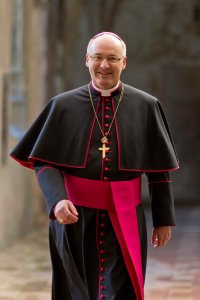 “Let me say two things in advance: I consider ecumenism as a fundamental mission from Christ Himself. In the Gospel of John, Christ prays to the Father, “that they may be one, as we are one… that they may be brought to perfection as one, that the world may know that you sent me” (John 17: 22b, 23). We must remain true to this fundamental mission of Christ. It’s not a matter of ecumenism yes or no, but of the path of ecumenism, the path to unity. We all yearn for this unity – as do I!
“Let me say two things in advance: I consider ecumenism as a fundamental mission from Christ Himself. In the Gospel of John, Christ prays to the Father, “that they may be one, as we are one… that they may be brought to perfection as one, that the world may know that you sent me” (John 17: 22b, 23). We must remain true to this fundamental mission of Christ. It’s not a matter of ecumenism yes or no, but of the path of ecumenism, the path to unity. We all yearn for this unity – as do I!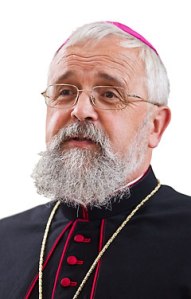 Opposing the actions of the seven bishops is Bishop Gerhard Feige, bishop of Magdeburg and president of the ecumenism commission of the German Bishops’ Conference. In a contribution to Der Zeit last Thursday, Msgr. Feige stated that not taking the chance to help people deepen the joy of the faith and their participation in the Eucharist, as well as promoting ecumenical encounters and strengthening the marriage bond would be “macabre and shameful”. Contrary to other bishops, Msgr. Feige insists that the pastoral outreach exists within modern theological and legal possibilities, referring to the canon law paragraphs which allow local bishops to decide under which circumstances non-Catholic can receive Communion. These circumstances, however, are emergency situations in which the danger of death and the unavailability of ministers of a person’s own denomination play key roles.
Opposing the actions of the seven bishops is Bishop Gerhard Feige, bishop of Magdeburg and president of the ecumenism commission of the German Bishops’ Conference. In a contribution to Der Zeit last Thursday, Msgr. Feige stated that not taking the chance to help people deepen the joy of the faith and their participation in the Eucharist, as well as promoting ecumenical encounters and strengthening the marriage bond would be “macabre and shameful”. Contrary to other bishops, Msgr. Feige insists that the pastoral outreach exists within modern theological and legal possibilities, referring to the canon law paragraphs which allow local bishops to decide under which circumstances non-Catholic can receive Communion. These circumstances, however, are emergency situations in which the danger of death and the unavailability of ministers of a person’s own denomination play key roles.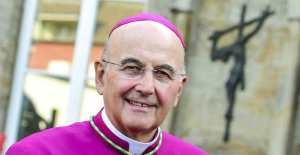 Münster’s Bishop Felix Genn is hopeful of finding a consensus. While the way in which the seven bishops expressed their difficulties with the conference’s vote did not make him happy, he understands their questions of conscience. In an interview for WDR radio Bishop Genn expressed his happiness about the way in which the standing council of the bishops’ conference discussed the issue last week. And although he would have preferred that the seven bishops had first informed the others about their letter before sending it, Bishop Genn’s attitude is perhaps the most consensus-minded in the delegation, which may be a reason for his inclusion. The bishop, for his part, simply thought of his mother’s motto when hearing about being included in the delegation: “One has never got enough work to do.”
Münster’s Bishop Felix Genn is hopeful of finding a consensus. While the way in which the seven bishops expressed their difficulties with the conference’s vote did not make him happy, he understands their questions of conscience. In an interview for WDR radio Bishop Genn expressed his happiness about the way in which the standing council of the bishops’ conference discussed the issue last week. And although he would have preferred that the seven bishops had first informed the others about their letter before sending it, Bishop Genn’s attitude is perhaps the most consensus-minded in the delegation, which may be a reason for his inclusion. The bishop, for his part, simply thought of his mother’s motto when hearing about being included in the delegation: “One has never got enough work to do.”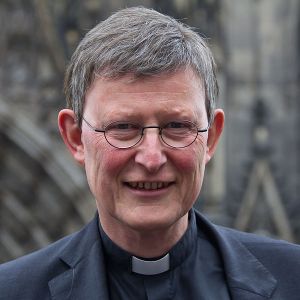 While the letter by Cardinal Woelki, Archbishop Schick and Bishops Zdarsa, Hanke, Ipolt, Voderholzer and Oster received much attention in the media, the signatories themselves treated it as a normal matter of correspondence. Cardinal Woelki, who was visiting Ukraine when the news broke, expressed his surprise at the hype and the talk about dissent. Presenting the questions about intercommunion to Rome was not so much a matter of going against his fellow bishops, but rather came from the importance of the matter: “With several bishops, we were convinced that it would be good to universally coordinate the solution that we have discussed and established here, with an eye on the unity of the Church and the common ground with the other particular churches.” Cardinal Woelki is not so much opposed to the proposals from the conference, to allow non-Catholic spouses of Catholics to receive Communion with their partner on a case-by-case basis, but does not think it is a decision that should be made by the German bishops alone.
While the letter by Cardinal Woelki, Archbishop Schick and Bishops Zdarsa, Hanke, Ipolt, Voderholzer and Oster received much attention in the media, the signatories themselves treated it as a normal matter of correspondence. Cardinal Woelki, who was visiting Ukraine when the news broke, expressed his surprise at the hype and the talk about dissent. Presenting the questions about intercommunion to Rome was not so much a matter of going against his fellow bishops, but rather came from the importance of the matter: “With several bishops, we were convinced that it would be good to universally coordinate the solution that we have discussed and established here, with an eye on the unity of the Church and the common ground with the other particular churches.” Cardinal Woelki is not so much opposed to the proposals from the conference, to allow non-Catholic spouses of Catholics to receive Communion with their partner on a case-by-case basis, but does not think it is a decision that should be made by the German bishops alone.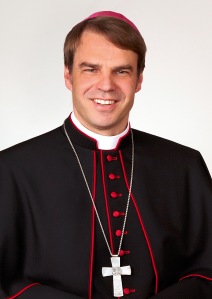 The most extensive explanation for signing the letter comes from Bishop Stefan Oster of Passau. In an article published in the diocesan magazine and
The most extensive explanation for signing the letter comes from Bishop Stefan Oster of Passau. In an article published in the diocesan magazine and 


 Bishop Franz-Josef Bode of Osnabrück has been making some minor headlines with his comments about opening up the reception of the sacrament of Holy Communion to non-Catholic spouses of Catholic faithful. In
Bishop Franz-Josef Bode of Osnabrück has been making some minor headlines with his comments about opening up the reception of the sacrament of Holy Communion to non-Catholic spouses of Catholic faithful. In 


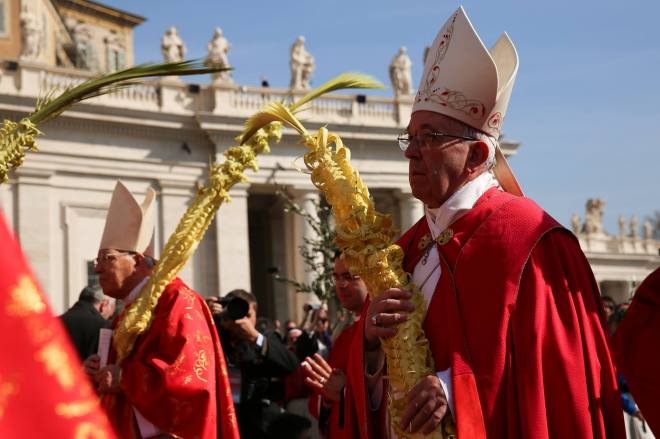
 Bishop Gerard de Korte, bishop of Groningen-Leeuwarden:
Bishop Gerard de Korte, bishop of Groningen-Leeuwarden: Wim Cardinal Eijk, archbishop of Utrecht:
Wim Cardinal Eijk, archbishop of Utrecht: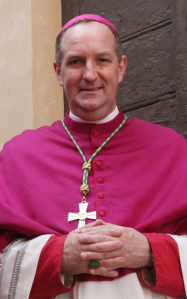 Bishop Theodorus Hoogenboom, auxiliary bishop of Utrecht:
Bishop Theodorus Hoogenboom, auxiliary bishop of Utrecht: Bishop Herman Woorts, auxiliary bishop of Utrecht:
Bishop Herman Woorts, auxiliary bishop of Utrecht:
 In 2011 Bishop Hans van den Hende, bishop of Rotterdam, gave one of the catechesis classes during the World Youth Days in Madrid.
In 2011 Bishop Hans van den Hende, bishop of Rotterdam, gave one of the catechesis classes during the World Youth Days in Madrid.  4. To be a disciple of Jesus: learning from Jesus
4. To be a disciple of Jesus: learning from Jesus